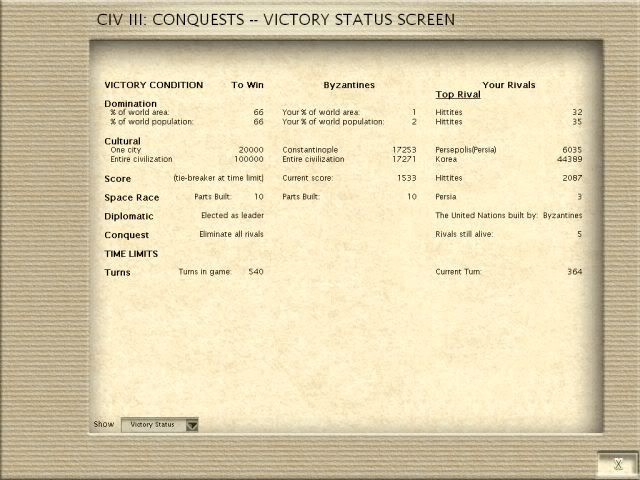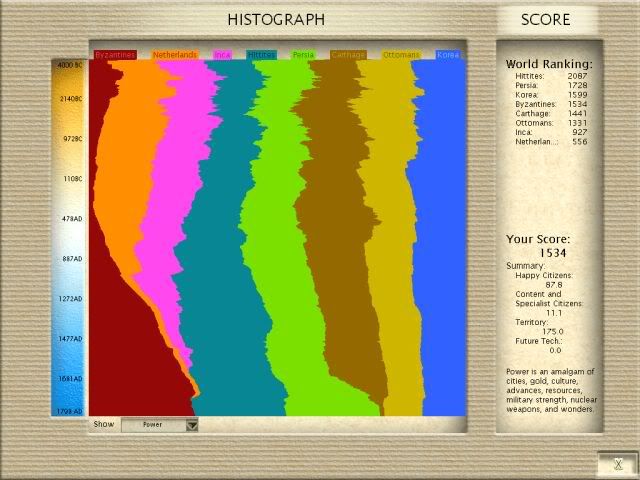Full-throttled - Top speed all the way for earliest possible victory.
Emperor - Difficulty level.
OCC - One City Challenge.
Space Race - Desired victory condition (all default VC's enabled)
Over the past six months I have developed my strategy for OCC Space Race on Monarch. It is now time to give it a shot on Emperor. Although I prefer England or Portugal on Monarch level games, I chose the scientific Byzantines for their free techs, which could possibly save me 25 turns of research. The very first start I roll:
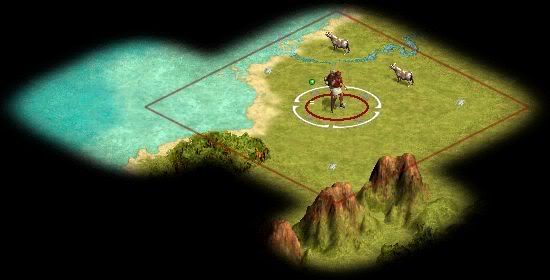
A couple of hills would have been nice, but I'm not going to throw away two cattle on river. Constantinople is founded in 4000 BC, begins building a warrior, to be followed by a curragh. The worker moves out to irrigate and road the cattle. Set research on Pottery at 100%.
Our curragh heads out in 3500 BC, and we begin a second warrior. Pottery comes in on the interturn, and we set our research to Writing at 10%.
We meet the Inca in 3350 BC. They have Masonry, lack Alphabet, and their treasury is at 20 gold. They won't trade, so the civ they met must be either commercial or seafaring. After the second warrior, we build a worker, then start on our granary.
A Dutch warrior is seen on the east coast of our continent in 3050 BC. As suspected, they have Masonry and no gold. The Inca are now willing to accept our offer, and we get Masonry for Alphabet. They were still a bit stingy, and wouldn't give us even a single gold piece.
After completion of our granary, we build a second curragh, two more workers, then begin construction on The Colossus. Our first curragh explores a small island east of Amsterdam, and our second travels north past a small island northwest of our continent, meeting Korea in 2010 BC. They have Warrior Code and 10 gold, but lack Masonry and Pottery. By this time, the Inca and the Netherlands also have Warrior Code. The Netherlands even have The Wheel. We offer Pottery to Korea, and in return he gives us Warrior Code and 10 gold.
The Inca learn Ceremonial Burial in 2390 BC and later trade it and their 20 gold to the Netherlands for The Wheel. In 2230 BC Korea discovers Iron Working. We get that in exchange for Masonry and 144 gold - nearly our entire treasury. Iron Working gets The Wheel and 20 gold from the Netherlands, then Ceremonial Burial from the Inca. The Wheel gets our 144 gold back from Korea. Not a bad round of trades if I do say so myself.
Our curraghs have recently dared the oceans to the east. The first headed out east of the Incan city of Tiwanaku, and sank in 2270 BC. The second headed east from the northeast tip of the Korean island-continent, survived four turns in the ocean, and met the Ottomans in 2110 BC. We trade Iron Working to the Ottomans for Mysticism and 26 gold. No other rival that we know has Mysticism.
We complete the Colossus in 2070 BC, build a temple, then begin work on The Oracle. In 1830 BC, our curragh comes across a Carthaginian warrior while traveling along the north coast of the Ottoman continent. Carthage already knows Writing! We're still 13 turns away, so maybe studying Pottery at the start wasn't such a good idea. Carthage didn't have Iron Working or Mysticism, and looking back at the archive I see that we could have given him both techs and 81 gold for Writing. I cannot imagine why I didn't do that.
Anyway, Writing comes in on the interturn after 1500 BC. I make a few trades to get Mathematics and Horseback Riding, and start research on Code of Laws at max 70% science, due in 16 turns. Carthage already has Map Making, and the Ottomans have it in 1450 BC. On the interturn after 1450 BC, a Hittite scout shows up at our border and we complete the Oracle. The Hittites have Writing, but are otherwise backward. We sell Masonry for 10 gold and begin The Pyramids as a prebuild for The Great Lighthouse. With the Oracle complete, science goes up to 80% and Code of Laws will come two turns sooner.
In 1350 BC we meet Persia, who share the continent with the Ottomans and Carthage. They also share the tech lead, as they too have Map Making. The Hittites pick up the same on the interturn, and in 1325 BC we trade The Wheel, Iron Working and Mysticism to them for Map Making and switch our production as noted above.
On the interturn after 1150 BC, we discover Code of Laws. Carthage and the Ottomans discover Polytheism and Construction, trading so that they each have both. We trade Code of Laws to Carthage for Construction, but of course we cannot get Polytheism yet. Philosophy is due in 8 turns.
The Great Lighthouse is complete in 1100 BC, and we begin our next project, The Great Wall. Philosophy is due in 6 turns.
The date is now 1000 BC, and Philosophy is due in 2 turns.
Emperor - Difficulty level.
OCC - One City Challenge.
Space Race - Desired victory condition (all default VC's enabled)
Over the past six months I have developed my strategy for OCC Space Race on Monarch. It is now time to give it a shot on Emperor. Although I prefer England or Portugal on Monarch level games, I chose the scientific Byzantines for their free techs, which could possibly save me 25 turns of research. The very first start I roll:

A couple of hills would have been nice, but I'm not going to throw away two cattle on river. Constantinople is founded in 4000 BC, begins building a warrior, to be followed by a curragh. The worker moves out to irrigate and road the cattle. Set research on Pottery at 100%.
Our curragh heads out in 3500 BC, and we begin a second warrior. Pottery comes in on the interturn, and we set our research to Writing at 10%.
We meet the Inca in 3350 BC. They have Masonry, lack Alphabet, and their treasury is at 20 gold. They won't trade, so the civ they met must be either commercial or seafaring. After the second warrior, we build a worker, then start on our granary.
A Dutch warrior is seen on the east coast of our continent in 3050 BC. As suspected, they have Masonry and no gold. The Inca are now willing to accept our offer, and we get Masonry for Alphabet. They were still a bit stingy, and wouldn't give us even a single gold piece.
After completion of our granary, we build a second curragh, two more workers, then begin construction on The Colossus. Our first curragh explores a small island east of Amsterdam, and our second travels north past a small island northwest of our continent, meeting Korea in 2010 BC. They have Warrior Code and 10 gold, but lack Masonry and Pottery. By this time, the Inca and the Netherlands also have Warrior Code. The Netherlands even have The Wheel. We offer Pottery to Korea, and in return he gives us Warrior Code and 10 gold.
The Inca learn Ceremonial Burial in 2390 BC and later trade it and their 20 gold to the Netherlands for The Wheel. In 2230 BC Korea discovers Iron Working. We get that in exchange for Masonry and 144 gold - nearly our entire treasury. Iron Working gets The Wheel and 20 gold from the Netherlands, then Ceremonial Burial from the Inca. The Wheel gets our 144 gold back from Korea. Not a bad round of trades if I do say so myself.
Our curraghs have recently dared the oceans to the east. The first headed out east of the Incan city of Tiwanaku, and sank in 2270 BC. The second headed east from the northeast tip of the Korean island-continent, survived four turns in the ocean, and met the Ottomans in 2110 BC. We trade Iron Working to the Ottomans for Mysticism and 26 gold. No other rival that we know has Mysticism.
We complete the Colossus in 2070 BC, build a temple, then begin work on The Oracle. In 1830 BC, our curragh comes across a Carthaginian warrior while traveling along the north coast of the Ottoman continent. Carthage already knows Writing! We're still 13 turns away, so maybe studying Pottery at the start wasn't such a good idea. Carthage didn't have Iron Working or Mysticism, and looking back at the archive I see that we could have given him both techs and 81 gold for Writing. I cannot imagine why I didn't do that.

Anyway, Writing comes in on the interturn after 1500 BC. I make a few trades to get Mathematics and Horseback Riding, and start research on Code of Laws at max 70% science, due in 16 turns. Carthage already has Map Making, and the Ottomans have it in 1450 BC. On the interturn after 1450 BC, a Hittite scout shows up at our border and we complete the Oracle. The Hittites have Writing, but are otherwise backward. We sell Masonry for 10 gold and begin The Pyramids as a prebuild for The Great Lighthouse. With the Oracle complete, science goes up to 80% and Code of Laws will come two turns sooner.
In 1350 BC we meet Persia, who share the continent with the Ottomans and Carthage. They also share the tech lead, as they too have Map Making. The Hittites pick up the same on the interturn, and in 1325 BC we trade The Wheel, Iron Working and Mysticism to them for Map Making and switch our production as noted above.
On the interturn after 1150 BC, we discover Code of Laws. Carthage and the Ottomans discover Polytheism and Construction, trading so that they each have both. We trade Code of Laws to Carthage for Construction, but of course we cannot get Polytheism yet. Philosophy is due in 8 turns.
The Great Lighthouse is complete in 1100 BC, and we begin our next project, The Great Wall. Philosophy is due in 6 turns.
The date is now 1000 BC, and Philosophy is due in 2 turns.

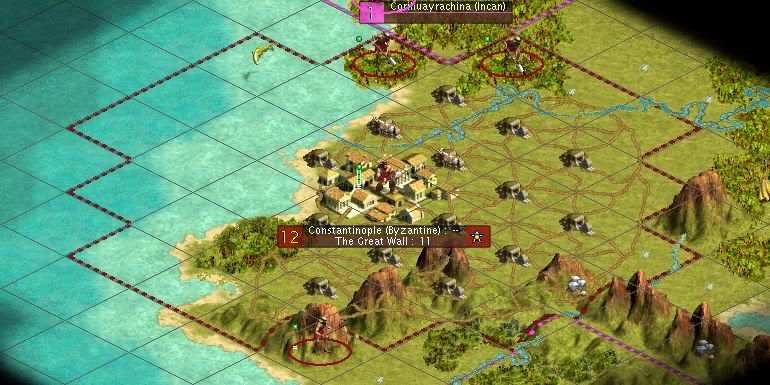
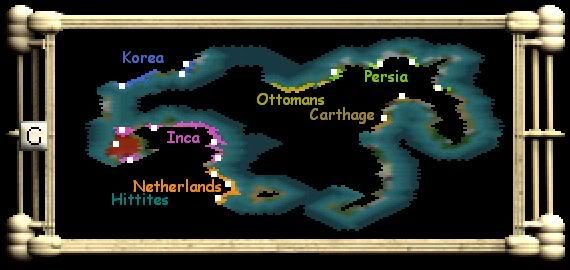
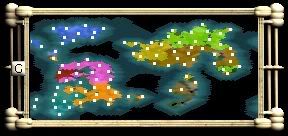
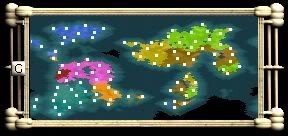
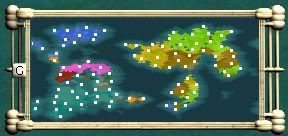

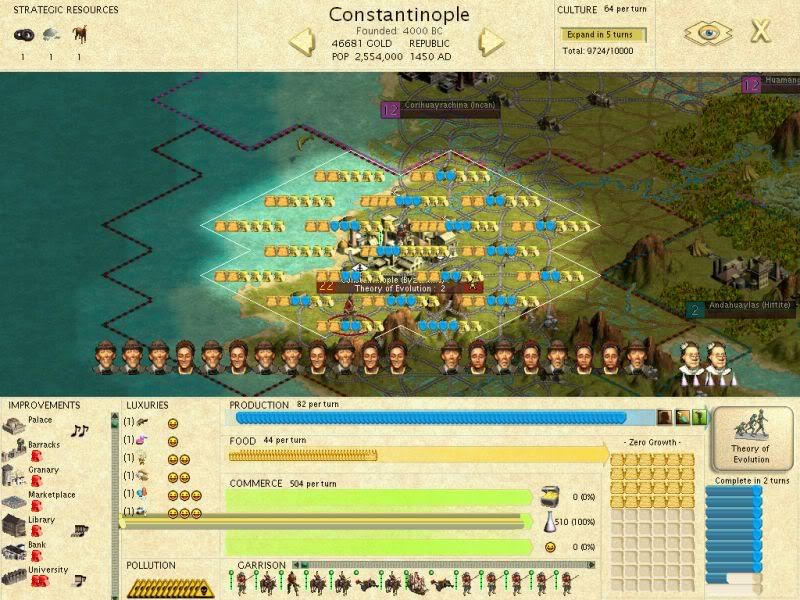
 . Oh yeah, mobilization thing.
. Oh yeah, mobilization thing.
